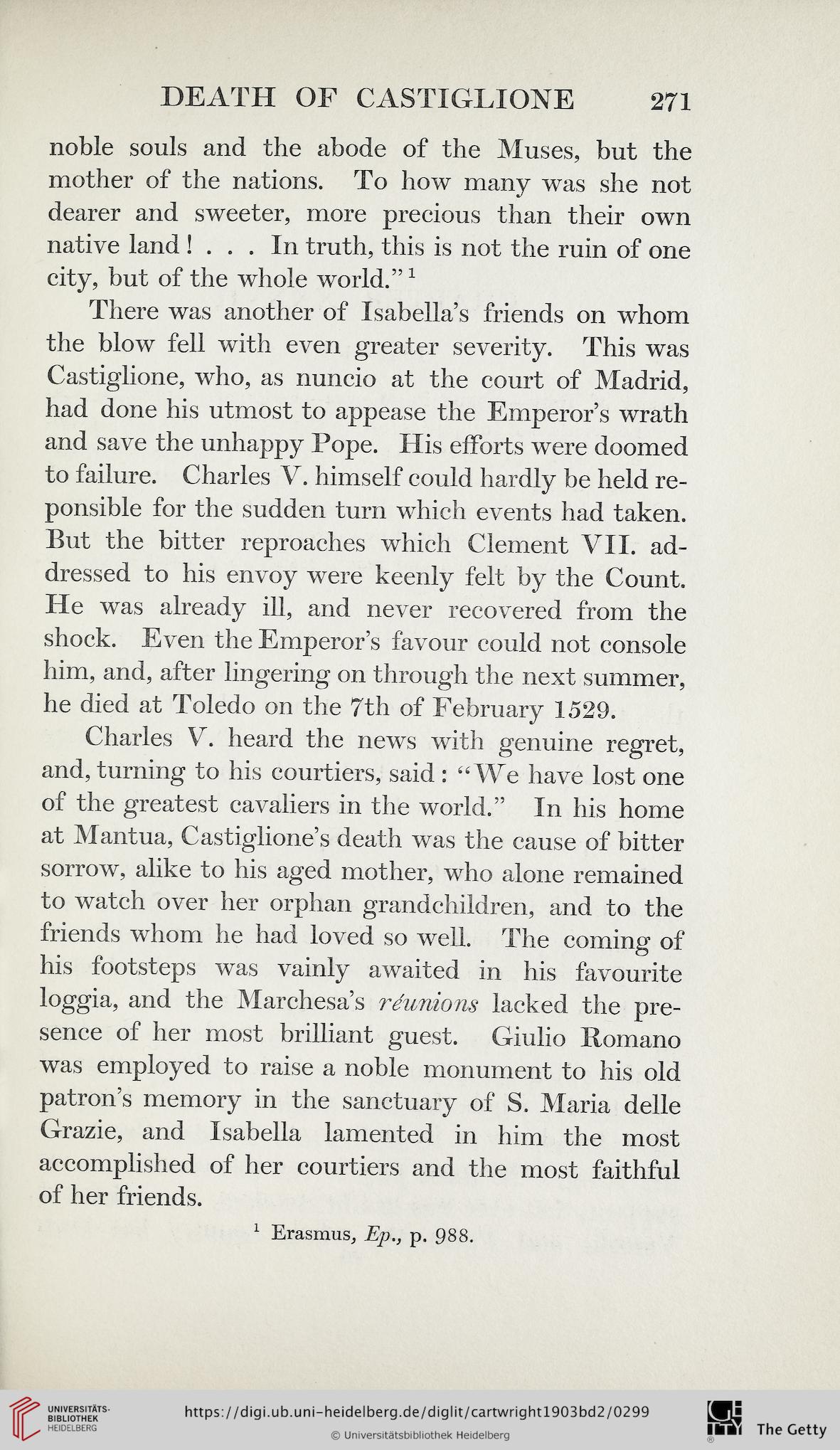DEATH OF CASTIGLIONE
271
noble souls and the abode of the Muses, but the
mother of the nations. To how many was she not
dearer and sweeter, more precious than their own
native land! ... In truth, this is not the ruin of one
city, but of the whole world.”1
There was another of Isabella’s friends on whom
the blow fell with even greater severity. This was
Castiglione, who, as nuncio at the court of Madrid,
had done his utmost to appease the Emperor’s wrath
and save the unhappy Pope. His efforts were doomed
to failure. Charles V. himself could hardly be held re-
ponsible for the sudden turn which events had taken.
But the bitter reproaches which Clement VII. ad-
dressed to his envoy were keenly felt by the Count.
He was already ill, and never recovered from the
shock. Even the Emperor’s favour could not console
him, and, after lingering on through the next summer,
he died at Toledo on the 7th of February 1529.
Charles V. heard the news with genuine regret,
and, turning to his courtiers, said : “We have lost one
of the greatest cavaliers in the world.” In his home
at Mantua, Castiglione’s death was the cause of bitter
sorrow, alike to his aged mother, who alone remained
to watch over her orphan grandchildren, and to the
friends whom he had loved so well. The coming of
his footsteps was vainly awaited in his favourite
loggia, and the Marchesa’s reunions lacked the pre-
sence of her most brilliant guest. Giulio Romano
was employed to raise a noble monument to his old
patron’s memory in the sanctuary of S. Maria delle
Grazie, and Isabella lamented in him the most
accomplished of her courtiers and the most faithful
of her friends.
Erasmus, Ep., p. 988.
271
noble souls and the abode of the Muses, but the
mother of the nations. To how many was she not
dearer and sweeter, more precious than their own
native land! ... In truth, this is not the ruin of one
city, but of the whole world.”1
There was another of Isabella’s friends on whom
the blow fell with even greater severity. This was
Castiglione, who, as nuncio at the court of Madrid,
had done his utmost to appease the Emperor’s wrath
and save the unhappy Pope. His efforts were doomed
to failure. Charles V. himself could hardly be held re-
ponsible for the sudden turn which events had taken.
But the bitter reproaches which Clement VII. ad-
dressed to his envoy were keenly felt by the Count.
He was already ill, and never recovered from the
shock. Even the Emperor’s favour could not console
him, and, after lingering on through the next summer,
he died at Toledo on the 7th of February 1529.
Charles V. heard the news with genuine regret,
and, turning to his courtiers, said : “We have lost one
of the greatest cavaliers in the world.” In his home
at Mantua, Castiglione’s death was the cause of bitter
sorrow, alike to his aged mother, who alone remained
to watch over her orphan grandchildren, and to the
friends whom he had loved so well. The coming of
his footsteps was vainly awaited in his favourite
loggia, and the Marchesa’s reunions lacked the pre-
sence of her most brilliant guest. Giulio Romano
was employed to raise a noble monument to his old
patron’s memory in the sanctuary of S. Maria delle
Grazie, and Isabella lamented in him the most
accomplished of her courtiers and the most faithful
of her friends.
Erasmus, Ep., p. 988.




